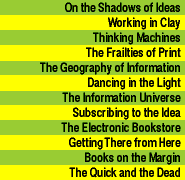


The Power of Ideas
A book is a machine to think with.I. A. Richards,
Principles of Literary Criticism
A stand can be made against invasion by an army; no stand can be made against invasion by an idea.Victor Hugo,
The History of a Crime
If nature has made any one thing less susceptible than all others of exclusive property, it is the action of the thinking power called an idea, which an individual may exclusively possess as long as he keeps it to himself.They were kings of the hill. They dominated every ecosystem. But for them, as for all life, there is only one rule: adapt or die. As they roamed the veldt and the marshes and the seas, living life as they had for millions of years, an asteroid was just entering the atmosphere. Things were about to change greatly. And the dinosaurs had no idea.Thomas Jefferson
The asteroid was about ten kilometers across---the size of a small mountain. Traveling at over a hundred thousand kilometers an hour, it would strike with an impact releasing about a hundred million megatons of energy. The destruction would be roughly equal to exploding ten copies of the bomb used to destroy Nagasaki on every square kilometer of the earth's surface, oceans included.
As the pitted mass of iron and nickel entered the atmosphere, any dinosaurs looking up would have briefly seen a giant fireball. First it flared orange, then blue-white, then became more blinding than the sun---all in fractions of a second. It may have hit just north of the Yucatan Peninsula in Mexico. If so, it simply brushed aside the ocean and slammed through to the seabed, then straight down into the magma beneath the earth's crust. There it vaporized in a titanic fireball extending far into the stratosphere. The local temperature jumped to ten million degrees centigrade and the sky began to burn.
The impact produced an instant volcano, cratering the earth eighty kilometers deep---deeper than the height of twenty Everests---in a circle two hundred kilometers wide---an area bigger than Vancouver Island. The blast heat vaporized perhaps a million million tons of seawater and made silt and salt rain down all over the world.
A shock wave as dense as a wall of granite ran through the oceans and the earth's crust at nearly the speed of sound, crushing everything in its path. Kilometer-high tidal waves, monster hurricanes, worldwide firestorms, earthquakes, and volcanoes followed in its wake. All the earth turned dark as clouds and dust pinched off the life-giving sunlight. Dirty salty rain and snow fell everywhere.
Lifeforms divided into the quick and the dead. Millions of creatures died in the first few minutes, drowned, burned, crushed, suffocated. Millions upon millions followed in the next days and weeks and months as ecosystems changed too radically for them to keep up. Seventy percent of all living species died out. Many regions were simply washed clean of life. After 150 million years of dominance, the dinosaurs ended their reign on earth, leaving their only descendants, the birds.
Something like this event may have occurred about sixty-five million years ago. Roughly five hundred years ago, something similar happened to scribes when an obscure goldsmith named Johann Gutenberg invented his printing device. For them, the change was almost as dramatic and, in the long run, just as deadly.